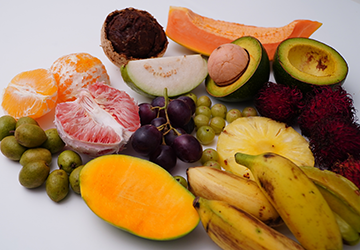Top 10 Superfoods to Boost Your Immune System
When it comes to keeping our immune system healthy, nutrition is vital. Our body needs essential vitamins and minerals to function correctly, which can weaken our immune system, leaving us susceptible to infections and diseases. That's where superfoods come in - foods that are particularly rich in nutrients that can help boost our immunity. In the following article, we'll explore the ten superfoods that can effectively strengthen and maintain the health of your immune system.
Superfoods: An Overview
Superfoods are nutrient-dense foods that offer considerable health benefits. These foods contain many vital nutrients such as vitamins, minerals, antioxidants, and more, all of which can aid in bolstering the immune system and support general well-being.
10 Superfoods for Strengthening Your Immune System
1. Papaya
i. Advantages for overall health
Papaya is a tropical fruit rich in vitamin C, vitamin A, potassium, and antioxidants. It promotes good digestive health, reduces inflammation, and can help prevent heart disease and cancer.
ii. Immune system bolstering effects.
Papaya's abundant vitamin C levels can boost the production of white blood cells that guard the body against illnesses and infections. Regular consumption of papaya can help maintain optimal vitamin C levels, ensuring a robust immune system.

2. Sweet Potatoes
i. Advantages for overall health
Sweet potatoes are a rich source of essential nutrients like vitamin A, C, manganese, antioxidants, and fiber. They can help maintain healthy skin, support good vision and aid digestion.
ii. Immune system bolstering effects.
Vitamin A in sweet potatoes plays a vital role in maintaining the integrity of the immune system. It helps produce white blood cells and supports the functioning of the mucosal barriers that protect against infections.
3. Kale
i. Advantages for overall health
Kale, a green leafy vegetable, has many crucial nutrients like vitamins A, C, and K and calcium, iron, and antioxidants. It can support bone health heart health and promote digestive wellness.
ii. Immune system bolstering effects.
Abundant in antioxidants, Kale can counteract the adverse effects of free radicals that could potentially harm cells and diminish the body's immune system. Additionally, the vitamins A and C in Kale support the production of white blood cells, contributing to a healthy immune system.
4. Avocado
i. Advantages for overall health
Avocados are replete with beneficial monounsaturated fats, fiber, potassium, and vitamins E and K, which can aid in promoting heart health, enhancing digestion, and supporting healthy skin.
ii. Immune system bolstering effects.
The healthy fats in avocados help absorb fat-soluble vitamins like vitamin A, essential for a healthy immune system. Vitamin E, an antioxidant found in avocados, also supports immune function by protecting cells from damage.
5. Chia Seeds
i. Advantages for overall health
Chia seeds are an excellent source of protein, fiber, omega-3 fatty acids, and antioxidants that can benefit the body in numerous ways. They can help maintain a healthy weight, support heart health, and improve digestion.
ii. Immune system bolstering effects.
The anti-inflammatory attributes of omega-3 fatty acids present in chia seeds can support the immune system's health. Antioxidants in chia seeds also protect cells from damage, contributing to a robust immune response.
6. Kiwi
i. Advantages for overall health
Kiwi is a nutrient-dense fruit containing high amounts of vitamins C, K, E, potassium, and fiber. It can support heart health, improve digestion, and promote healthy skin.
ii. Immune system bolstering effects.
Kiwi's high vitamin C content plays a crucial role in the immune system by stimulating the production of white blood cells. Consuming kiwi regularly can help maintain adequate levels of vitamin C, ensuring a healthy immune system.
7. Quinoa
i. Advantages for overall health
Did you know that Quinoa is a great gluten-free whole-grain option? It is packed with essential minerals like magnesium, phosphorus, and manganese and is an excellent source of protein and fiber. It can support heart health, improve digestion, and help maintain a healthy weight.
ii. Immune system bolstering effects.
As a nutritious source of zinc, Quinoa can be beneficial in maintaining proper immune system function. Zinc supports the production and activity of white blood cells, helping to protect the body from infections and diseases.
8. Red Bell Peppers

i. Advantages for overall health
Red bell peppers contain high amounts of vitamins A and C, potassium, and antioxidants. They can support eye health, promote healthy skin, and reduce the risk of chronic diseases.
ii. Immune system bolstering effects.
Red bell peppers contain a higher amount of vitamin C than oranges, which is a vital nutrient in producing white blood cells and maintaining the immune system's health. The vitamin A in red bell peppers also helps keep the immune system's integrity.
9. Salmon
i. Advantages for overall health
Salmon is a fantastic source of omega-3 fatty acids, protein, and vitamin D. It can support heart health, improve brain function, and promote healthy skin.
ii. Immune system bolstering effects.
Salmon's omega-3 fatty acids possess anti-inflammatory characteristics that can contribute to maintaining the immune system's health. Vitamin D, found in salmon, also plays a crucial role in immune function by modulating the activity of immune cells.
10. Mushrooms
i. Advantages for overall health
Mushrooms are rich in essential nutrients like vitamin D, selenium, potassium, and antioxidants. They can support a healthy immune system, promote heart health, and help maintain a healthy weight.
ii. Immune system bolstering effects.
Mushrooms have beta-glucans that activate immune cells, enhancing the immune system's function. Mushrooms' vitamin D and selenium can regulate white blood cells' function and guard cells against damage, thereby supporting the immune system's health.
Conclusion
Incorporating these superfoods into your daily diet could improve overall health and an enhanced immune system. A well-functioning immune system protects your body from illness and maintains optimal health. Start adding these superfoods to your meals and experience the benefits they offer.
FAQs
1. Can I eat too many superfoods?
While superfoods are highly nutritious, it's essential to maintain a balanced diet and not rely solely on these foods. Maintaining a well-balanced diet that includes various vegetables, fruits, whole grains, lean proteins, and healthy fats is essential to achieve and maintain good health.
2. How often should I consume superfoods to boost my immune system?
Aim to include a variety of superfoods in your daily meals. This will ensure you get essential nutrients to support your immune system and overall health.
3. Can I take supplements instead of eating superfoods?
While supplements offer particular advantages, obtaining nutrients from whole foods is generally considered the most beneficial approach. Whole foods combine vitamins, minerals, fiber, and other compounds that work together to support your health.
4. Are there any side effects of consuming superfoods?
Most superfoods are safe to consume. However, if you have allergies or sensitivities to certain foods, consult your doctor or a registered dietitian before adding them.
5. Are superfoods suitable for everyone?
Superfoods can benefit people of all ages, from children to seniors. However, it is prudent to seek the guidance of a healthcare professional or registered dietitian in case of specific dietary requirements or health concerns.





